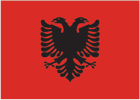Compare
Falkland Islands
to
Albaniato
AlbaniaAlbania has an unemployment rate of 18.00% while Falkland Islands has 4.10%
This entry contains the percent of the labor force that is without jobs.
Source:
CIA World Factbook
The GDP per capita in Albania is $10,700 while in Falkland Islands it is $55,400
This entry shows GDP on a purchasing power parity basis divided by population as of 1 July for the same year. A nation's GDP at purchasing power parity (PPP) exchange rates is the sum value of all goods and services produced in the country valued at prices prevailing in the United States. This is the measure most economists prefer when looking at per-capita welfare and when comparing living conditions or use of resources across countries. The measure is difficult to compute, as a US dollar value has to be assigned to all goods and services in the country regardless of whether these goods and services have a direct equivalent in the United States (for example, the value of an ox-cart or non-US military equipment); as a result, PPP estimates for some countries are based on a small and sometimes different set of goods and services. In addition, many countries do not formally participate in the World Bank's PPP project that calculates these measures, so the resulting GDP estimates for these countries may lack precision. For many developing countries, PPP-based GDP measures are multiples of the official exchange rate (OER) measure. The differences between the OER- and PPP-denominated GDP values for most of the wealthy industrialized countries are generally much smaller.
Source:
CIA World Factbook
Falkland Islands consumes 4.4352 gallons of oil per day per capita while Albania consumes 0.5334
This entry is the total oil consumed in gallons per day (gal/day) divided by the population. The discrepancy between the amount of oil produced and/or imported and the amount consumed and/or exported is due to the omission of stock changes, refinery gains, and other complicating factors.
Source:
CIA World Factbook
The per capita consumption of electricity in Falkland Islands is 6,221kWh while in Albania it is 1,506kWh
This entry consists of total electricity generated annually plus imports and minus exports, expressed in kilowatt-hours. The discrepancy between the amount of electricity generated and/or imported and the amount consumed and/or exported is accounted for as loss in transmission and distribution.
Source:
CIA World Factbook
 With its 3,020,209 people, Albania is the
137th largest country in the world by
population. It is the 143rd largest country in the
world by area with 28,748 square kilometers.
With its 3,020,209 people, Albania is the
137th largest country in the world by
population. It is the 143rd largest country in the
world by area with 28,748 square kilometers.
Albania declared its independence from the Ottoman Empire in 1912, but was conquered by Italy in 1939, and occupied by Germany in 1943. Communist partisans took over the country in 1944. Albania allied itself first with the USSR (until 1960), and then with China (to 1978). In the early 1990s, Albania ended 46 years of xenophobic communist rule and established a multiparty democracy. The transition has proven challenging as successive governments have tried to deal with high unemployment, widespread corruption, dilapidated infrastructure, powerful organized crime networks, and combative political opponents. Albania has made progress in its democratic development since first holding multiparty elections in 1991, but deficiencies remain. International observers judged elections to be largely free and fair since the restoration of political stability following the collapse of pyramid schemes in 1997; however, each of Albania's post-communist elections have been marred by claims of electoral fraud. The 2009 general elections resulted in a coalition government, the first such in the country's history. In 2013, general elections achieved a peaceful transition of power and a second successive coalition government. Albania joined NATO in April 2009 and is a potential candidate for EU accession. Although Albania's economy continues to grow, it has slowed, and the country is still one of the poorest in Europe. A large informal economy and an inadequate energy and transportation infrastructure remain obstacles.
Check out the recommended reading list below for great sources of information on Albania